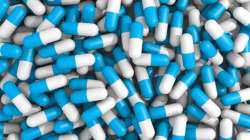Govt releases new list of essential medicines; THESE antibiotics to get cheaper
NLEM 2022: Covid drugs and vaccines have not been added to the list as they have been granted emergency use authorisations and the data is still not conclusive and complete from the regulatory perspective.

NLEM 2022: The Ministry of Health and Family Welfare on Tuesday released a list of new drugs and medicines that will be added to the National List of Essential Medicines (NLEM) making several antibiotics and vaccines cheaper and more affordable to the public.
Anti-cancer drugs like Bendamustine Hydrochloride, Irinotecan HCI Trihydrate, Lenalidomide and Leuprolide acetate effective in the treatment of various types of cancers have been added to the list. Some psychotherapeutic medicines, namely, Nicotine Replacement Therapy and Buprenorphine, have been added.
The total number of drugs under the NLEM is now 384 with the addition of anti-infectives like Ivermectin, Mupirocin and Meropenem. The drugs in NLEM are included in the scheduled category and their price is regulated by the National Pharmaceutical Pricing Authority.
"Antinfectives such as Ivermectin, Meropenem, Cefuroxime, Amikacin, Bedaquiline, Delamanid, Itraconazole ABC Dolutegravir have been added to the NLM," Dr Y K Gupta, Vice Chairman of the Standing National Committee on Medicines, said.
He said that the Covid drugs and vaccines have not been added to the list as they have been granted emergency use authorisations and the data is still not conclusive and complete from the regulatory perspective.
In the revised list, endocrine medicines and contraceptives Fludrocortisone, Ormeloxifene, Insulin Glargine and Teneliglitin have been added.
Montelukast, which acts on the respiratory tract, and the ophthalmological drug Latanoprost are also figured in the list. Besides, cardiovascular medicines Dabigatran and Tenecteplase too find a place in the list besides medicines used in palliative care.
Drugs that have been dropped off the list
Meanwhile, as many as 26 drugs have been dropped off the list based on cost-effectiveness and availability of better drugs. These include Ranitidine, Sucralfate, white petrolatum, Atenolol and Methyldopa have been dropped from the previous list of drugs
The criteria for the deletion of drugs from NLEM are based on factors like being banned in India, reports of concerns on the safety profile, the disease burden for which a medicine is indicated is no longer a national health concern and in the case of antimicrobials, if the resistance pattern has rendered an antimicrobial ineffective.
Union health minister Mandaviya launches NLEM
Speaking at the launch of the list Union Health Minister Mansukh Mandaviya said that his ministry is taking various steps under the vision of Prime Minister Narendra Modi towards "Sabko Dawai, Sasti Dawai".
"In this direction, National List of Essential Medicines (NLEM) plays an important role in ensuring accessibility of affordable quality medicines at all levels of healthcare. This will give boost to cost-effective, quality medicines and contribute towards a reduction in Out of Pocket Expenditure on healthcare for the citizens," he said.
What is the NLEM?
The primary purpose of NLEM is to promote rational use of medicines considering the three important aspects -- cost, safety and efficacy, Mandaviya said. He said the NLEM is a dynamic document and is revised on a regular basis considering the changing public health priorities as well as advancements in pharmaceutical knowledge.
The NLEM was formulated in 1996 and it was revised thrice earlier in 2003, 2011, and 2015. Revision of NLEM 2022 has been done after constant consultation with stakeholders spanning from academia, industrialists and public policy experts etc., and crucial documents like WHO EML 2021.
A revised list of 399 formulations was submitted by an expert committee under the Indian Council of Medical Research (ICMR) last year. After detailed analysis of Indian requirements, major changes were sought by Mandaviya.
The criteria for inclusion of drugs in NLEM are that they are useful in diseases which is a public health problem in India, licensed/ approved by Drugs Controller General of India (DCGI), and have proven efficacy and safety profile based on scientific evidence, are comparatively cost effective and have to be aligned with the current treatment guidelines and recommended under National Health Programs of India. (e.g. Ivermectin part of Accelerated Plan for Elimination of Lymphatic Filariasis 2018).
(With inputs from PTI)
ALSO READ | Rajasthan CM Ashok Gehlot sanctions Rs 30 cr for medicines, vaccines to prevent lumpy skin disease
ALSO READ | Ukrainian Health minister says Russia blocking access to medicines